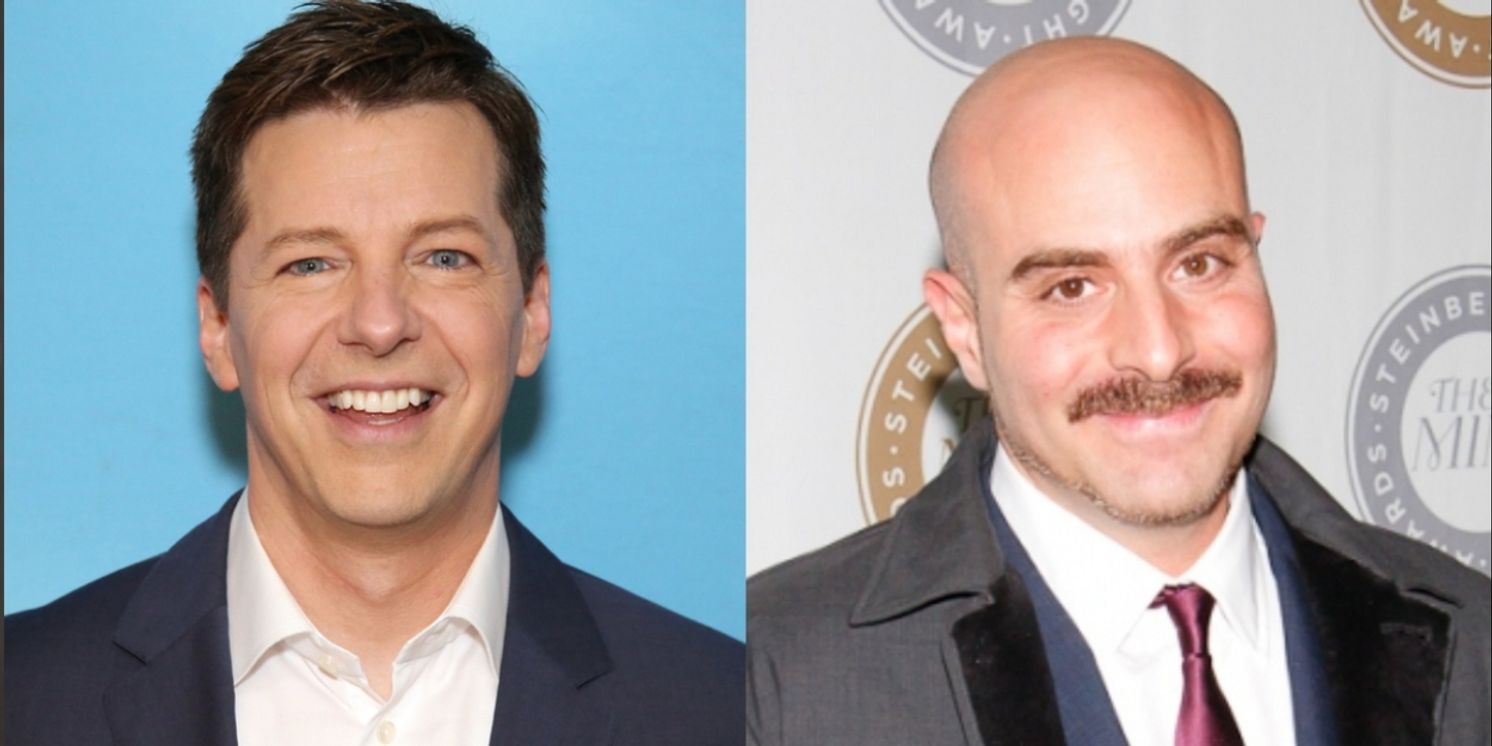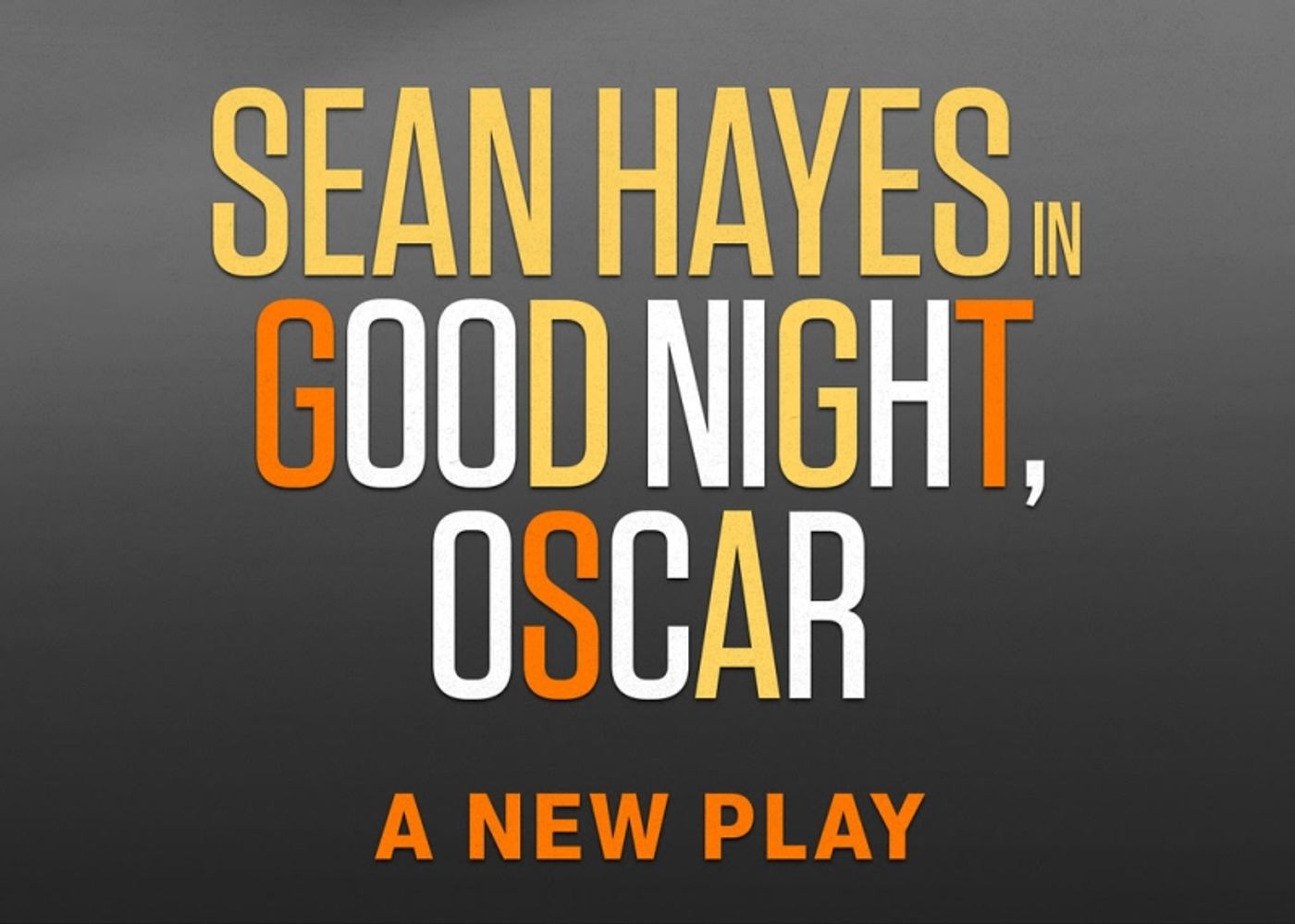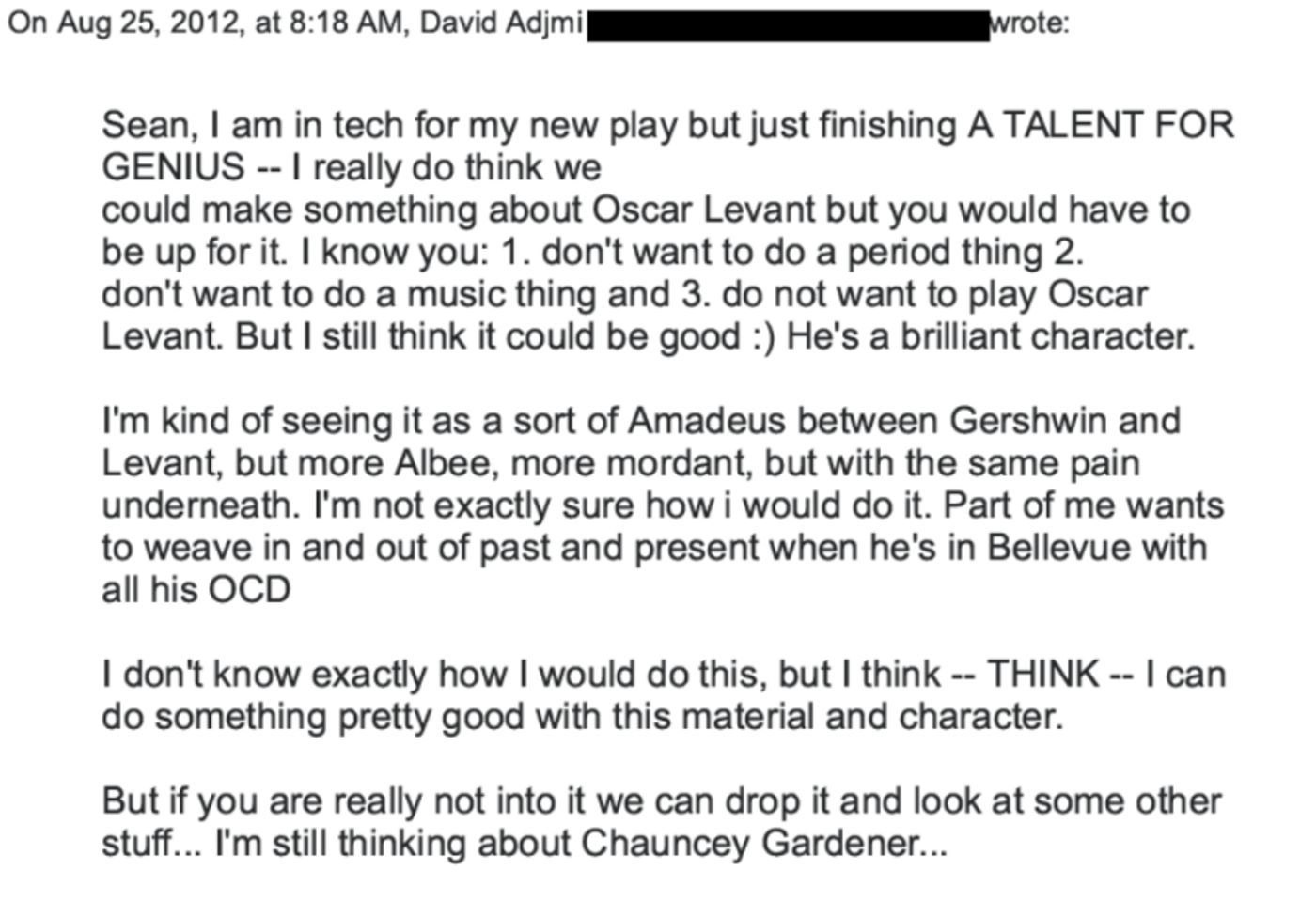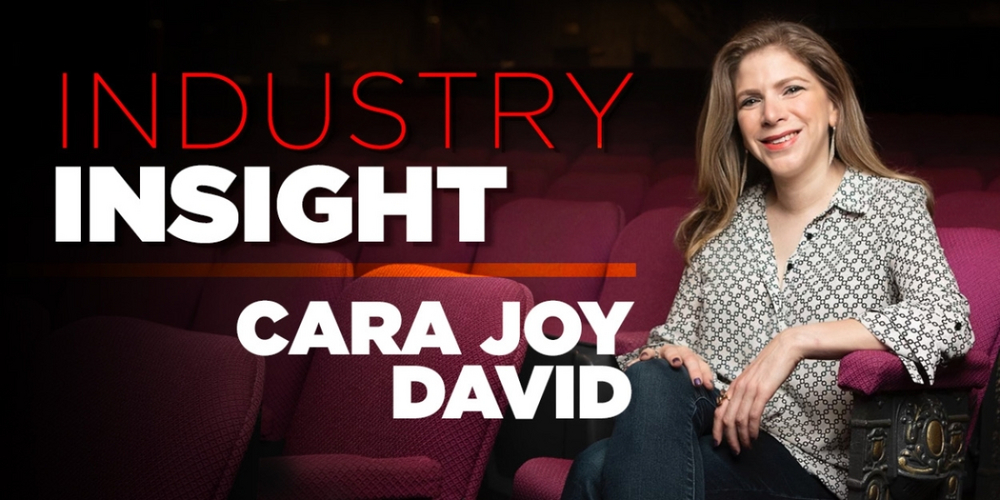GOOD NIGHT, OSCAR, The Behind-the-Scenes Battle Splayed Out In Public
David Adjmi and the Production Team of GOOD NIGHT, OSCAR Speak Out

There is a veil of secrecy behind a project's development. Other than the production team, few know who pitched for the musical version of, let's say, LEGALLY BLONDE. Songs might leak out at various composers' concerts, but it's fairly rare. And there are plays and musicals developed based on well-known people or properties that just fall away without any public announcement. So it surprised the industry this week when playwright David Adjmi went public about his own tale of developing an Oscar Levant play with Sean Hayes -- and not the one that will be seen on Broadway this spring. It has become a he said/they said battle, but BroadwayWorld has the most info in the war of words thus far, including emails between Adjmi and Hayes in which Adjmi appears to be convincing Hayes to play Levant. However, to understand any of this, context is necessary.
A few weeks ago, it was announced that Hayes would return to Broadway this spring in GOOD NIGHT, OSCAR, a play by Pulitzer Prize-winning playwright Doug Wright, about Oscar Levant. The news surprised no one -- the show played in Chicago earlier this year and was long rumored to transfer. At the time of the Broadway announcement, The New York Times ran a piece with quotes from Hayes that discussed the development of the piece. The narrative didn't include Adjmi (best known for the off-Broadway plays STUNNING, 3C and MARIE ANTIONETTE) and Adjmi was, in his words, "really upset."
"It was vague, but there was also sort of the insinuation that this was Sean's idea," Adjmi said in an interview. "And it wasn't, so I just wanted to set the record straight."
Adjmi took to social media to tell his version of events. In his post, he stated the following: "In 2012, Sean approached me to write an autobiographical play... I did not respond to the material. Sean said he wanted to work with me and suggested we brainstorm other ideas. After a series of conversations I pitched an idea to write a play about Oscar Levant. Sean said no. He did not want to play Oscar Levant, did not want to do a period play, or do anything involving music. Over emails (which I still have) I eventually convinced him to do it... Beth Williams, the producer, commissioned me to write the draft, and when I submitted it they asked for changes that would lighten the material."
Adjmi then wrote that he refused the changes, Williams passed, and Doug Wright took over (calling Adjmi first to ask for his "blessing"). But the main sourness of the post seemed to be rooted in the following point -- while Williams passed on Adjmi's play about Levant, she held onto the option, so he could not shop it elsewhere.
Rather than let Adjmi's version of events lie uncontested with a "no comment," the production responded to journalists' inquiries with a lengthy statement, excerpts of which first appeared in The New York Times Thursday night. In the statement, also provided to BroadwayWorld, which was "from the GOOD NIGHT, OSCAR team," a very different tale emerged. According to the production: "In 2010, after working together on PROMISES, PROMISES, Mr. Hayes and Ms. Williams discussed developing a project around Mr. Hayes' long-held interest in Oscar Levant's story. David Adjmi was chosen from a list of writers to develop a script in 2012. It was Mr. Hayes' longstanding interest in Oscar Levant that was the genesis of the collaboration."
The production statement then mentioned a portrait that Hayes had commissioned of himself as Levant in 2009. This all seemingly undermined Adjmi's narrative that the play was his idea in 2012.
When reached Friday, Adjmi did admit to seeing the portrait of Hayes as Levant, but stuck with the general tale from his social media post. As he wrote, Adjmi again stated that in 2012 Hayes approached him about penning a work inspired by Hayes' family, but the two began to speak about working on something else instead.
"He mentioned to me that he had been typecast in all these flamboyant gay roles and he didn't want to play that anymore," Adjmi relayed. "I felt like he was at a turning point -- he wanted to try something new. I thought: 'Okay. Maybe there is something we could come up with.' So I said: 'Let's meet up and I'm gonna talk to you and let's see if we can find the horizon where our aesthetics meet.'"
According to Adjmi, it was at their second or third lunch together that Hayes showed Adjmi the likeness of him as Levant. As per Adjmi, Adjmi said, "'Well, that's interesting, maybe that's something to explore,'" an idea Hayes rejected.
"He said he didn't want to play Oscar Levant onstage in no uncertain terms, he did not want to do that," Adjmi stated. "He didn't want to do a period piece, so that was out."
In Adjmi's narrative, he continued to explore the idea, later again discussing it with Hayes, this time over email. These are relevant excerpts of emails provided to BroadwayWorld from Adjmi in which, in 2012, Adjmi appears to be trying to convince Hayes to do a play about Oscar Levant:

.png?format=auto&width=1400)
(These emails have not been independently verified by BroadwayWorld for authenticity purposes.)
These emails appear to undermine the production's narrative that Hayes had wanted to play Levant onstage since 2010 and had been shopping out an Oscar Levant play to writers.
Regardless of the dispute about the project's inception, Adjmi agreed that, as the production's statement read, the sides had "different creative visions" regarding the work.
Adjmi said the team ended up wanting material that was "sunnier" than the material he wanted to write: "I had taken the assignment very explicitly saying: 'Sean, this will be my play and it's gonna be in my register. I'm not going to graft it around you...' So he knew, but I think he just forgot or something, and then he just felt very upset. I think in his mind he had taken a kind of ownership of the material."
In other words, Adjmi wanted to write his play in his way, the team didn't want to do it his way, there may have been some hard feelings on both sides. Not all that uncommon.
And Adjmi also agreed with the production's statement that: "There was no encumbrance on David Adjmi proceeding with his play after the option period he was paid for expired."
For while Adjmi's post was met with dozens of supportive responses, including several saying he should sue, Adjmi does not believe anything done was illegal. Legally it makes no difference whose original idea this was. New York had two WILD PARTYs at the same time for a reason -- the idea of making a play about a famous person or property in the public domain is not copyrightable. (This is a very different situation than lyricist David Zippel and composer Walter Afanasieff suing after being cut out of the musical version of TOOTSIE or Netflix suing over THE UNOFFICIAL BRIDGERTON MUSICAL.)
Williams did pay for the commission -- after the option expired in 2017, Adjmi was free to develop his Oscar Levant play. He simply believes the production's actions were taken in, what he called, "bad faith."
According to Adjmi, in 2015, when Williams officially told Adjmi's agent they would not be moving forward with his script, his agent was also told that he would be sued if he didn't "scrub all mention" of his play from the internet. Shortly thereafter, a press agent sent out a press release announcing a Sean Hayes Oscar Levant vehicle, with no author mentioned. The release read: "Beth Williams (Grove Entertainment), Barbara Whitman Productions and Hazy Mills Productions are pleased to announce the development of a new play based on the life of the legendary performer Oscar Levant... The play will star Emmy Award winner and Tony Award nominee Sean Hayes[.]"
This all did not sit well with Adjmi, who just wanted his play back. For Adjmi, once Williams passed on his play, she should have let it go. He believes he should have been allowed to develop it from 2015 on. Nevertheless, as Adjmi recognizes, Williams was acting within her legal rights to hold onto the piece, and was doing something rarely spoken about but not particularly rare. Producers have been known to keep options after notifying a creative that they do not intend to pursue a piece -- sometimes this is for strategic reasons, sometimes simply because minds change.
In Adjmi's post, he stated that when Wright (who Adjmi noted was President of the Dramatists Guild at the time) called him, he "hoped Doug would ask Sean and Beth to release my option as a condition to take the job, or that he'd flat out turn it down, but he simply accepted the assignment."
In the production's statement, Wright is quoted about the call, saying it was "cordial" and "Adjmi was gracious in telling me that I should accept the assignment."
"I was congenial," Adjmi agreed. "He's nice and he read my memoir when it came out and he was a very effusive and lovely. He's always been that way with me. I just felt that in this instance it was a conspicuous moral error on Doug's part and ethically, particularly as someone who is running the Dramatists Guild."
But Adjmi never told Wright (who he called "an amazingly talented writer") any of this, nor brought the situation to the Dramatists Guild. His outcry on social media did lead some to ponder publicly what the Guild does in these situations. When asked for a statement, the Dramatists Guild responded by stressing tools offered prior to contract signing. The Guild's statement read in part: "Contracts for writers vary greatly across the industry; in this particular case, we do not know all the facts about the situation, so we cannot comment on it further. The Dramatists Guild protects and empowers writers by providing free contract reviews, model contracts, community building events, career training workshops, and educational programs."
Adjmi said he missed out on an opportunity to develop his very different Levant play, THE STUMBLE, at Sundance in 2015, but as soon as the option was up in 2017, he "submitted [his play] to a theater as a commission" and has had a reading. (Adjmi did not disclose the theater, but prior bios indicate it was Lincoln Center Theater, which presented his STUNNING.) But the play has, well, stumbled, on its way to a professional stage. Originally Adjmi was hoping it would be fast-tracked and come to New York before GOOD NIGHT, OSCAR, but development was delayed for various reasons. THE STUMBLE was excerpted in The Paris Review in 2020, so at least part of it is out in the world. Adjmi feels deeply passionate about it, is obviously protective over it and believes audiences will like it when it is done. But given the high-profile Oscar Levant play arriving in April, Adjmi now believes his show won't be onstage in the Big Apple anytime soon.
In the end -- in the "why are we here" of it all -- Adjmi seemed to mostly want to get it all off his chest.
"I just want justice to be served in a certain way," he said. "I just couldn't bear it anymore. You know living with this for seven years or however long it has been, trying to hurry up so I could get my play into production before this production comes, with more money and power behind it, it was just very draining for me."
And so he decided to share his story. The production came back with their story. Legally there does not appear to be a difference, but pride often wins out. Each side hopes they will get the credit they believe they deserve. With both sides out there, it is readers who can decide who really wanted to do an Oscar Levant play first, what should happen in the situation once a producer passes on a work, and how much all of this matters.
Videos


